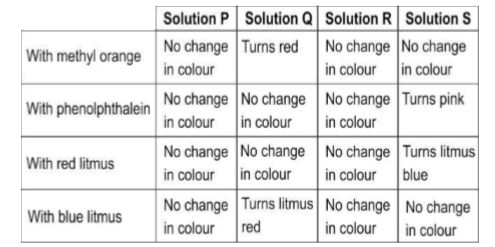Read the given passage and answer the questions.
P, Q, R are different colourless solids, while S is a colourless solution. They are in random order) Sodium chloride (NaCl), Calcium Carbonate (CaCO3), Acetic acid (CH3COOH) and Phenolphthalein indicator. Small amount of the above substances were added in pairs (e.g. P with Q, Q with R etc.) to a small amount of water in a test tube. They give the following results as shown in the observation table.
Observation Table:

If acetic acid and hydrochloric acid of same concentration are taken, HCl is a stronger acid because it contains:
more of Cl− ions.
more of H+ ions.
less of H+ ions
more of CH3COO− ions.
The correct Answer is:B
HCl is stronger because it gives rise to more H+ ions than acetic acid.
Topper's Solved these Questions
- ACIDS, BASES AND SALTSBOOK - OSWAL PUBLICATIONCHAPTER - ACIDS, BASES AND SALTSEXERCISE - Self Assessment - 1 (I. Objective Type Questions) A. Multiple Choice Questions
3 Videos
- ACIDS, BASES AND SALTSBOOK - OSWAL PUBLICATIONCHAPTER - ACIDS, BASES AND SALTSEXERCISE - Self Assessment - 1 (I. Objective Type Questions) B. Passage / Table Based Questions
4 Videos
- ACIDS, BASES AND SALTSBOOK - OSWAL PUBLICATIONCHAPTER - ACIDS, BASES AND SALTSEXERCISE - ASSERTION AND REASON BASED MCQs
8 Videos
- CARBON AND ITS COMPOUNDSBOOK - OSWAL PUBLICATIONCHAPTER - CARBON AND ITS COMPOUNDSEXERCISE - CREATING BASED QUESTIONS
23 Videos
Similar Questions
Read the given passage and answer the questions.
P, Q, R are different colourless solids, while S is a colourless solution. They are in random order) Sodium chloride (NaCl), Calcium Carbonate (CaCO3), Acetic acid (CH3COOH) and Phenolphthalein indicator. Small amount of the above substances were added in pairs (e.g. P with Q, Q with R etc.) to a small amount of water in a test tube. They give the following results as shown in the observation table.
Observation Table:

The chemicals are:

View SolutionRead the given passage and answer the questions.
P, Q, R are different colourless solids, while S is a colourless solution. They are in random order) Sodium chloride (NaCl), Calcium Carbonate (CaCO3), Acetic acid (CH3COOH) and Phenolphthalein indicator. Small amount of the above substances were added in pairs (e.g. P with Q, Q with R etc.) to a small amount of water in a test tube. They give the following results as shown in the observation table.
Observation Table:

Which of the following reaction is incorrect ?
View Solution
Knowledge Check
On adding phenolphthalein indicator to a colourless solution, no change is observed. The nature of the solution may be
AAcidic or basicBBasicCAcidic or neutralDBasic or neutralA small amount of sodium hydroxide solution is added to a small pieces of granulated zinc metal in a test tube. Which of the following represent correct equation?
AZn(s)+NaOH→Na2ZnO2+H2BZn(s)+NaOH→Zn(OH)2+NaOHCZnO+NaOH→Na2ZnO2+H2DZn+NaOH→ No reactionA small amount of copper oxide is taken in a test tube and dilute acid is added to it with stirring. Which colour will be obtained in the test tube ?
ABlue-greenBPinkCBlackDColourless
Read the given passage and answer the questions.
P, Q, R are different colourless solids, while S is a colourless solution. They are in random order) Sodium chloride (NaCl), Calcium Carbonate (CaCO3), Acetic acid (CH3COOH) and Phenolphthalein indicator. Small amount of the above substances were added in pairs (e.g. P with Q, Q with R etc.) to a small amount of water in a test tube. They give the following results as shown in the observation table.
Observation Table:

The chemicals that can be used as an acid base indicator by a visually impaired student is _____ .
View SolutionIn the above (i.e.., previous) problem, what is the ratio of P’s final amount to that of Q, if P and Q invest the same amounts??
View SolutionWhen a small amount of HCI is added to a buffer solution of acetic acid and sodium acetate
View SolutionAnand took four colourless solutions P, Q, R and S, and performed the following tests. What is the definite conclusion that Anand can reach?

View SolutionRead the given passage and answer the questions.
P, Q and R are three elements which undergo chemical reactions according to the following equations.
(i) P2O3+2Q→Q2O3+2P
(ii) 3RSO4+2Q→Q2(SO4)3+3R
(iii) 3RO+2P→P2O3+3R
The most reactive and the least reactive elements are:
View Solution
